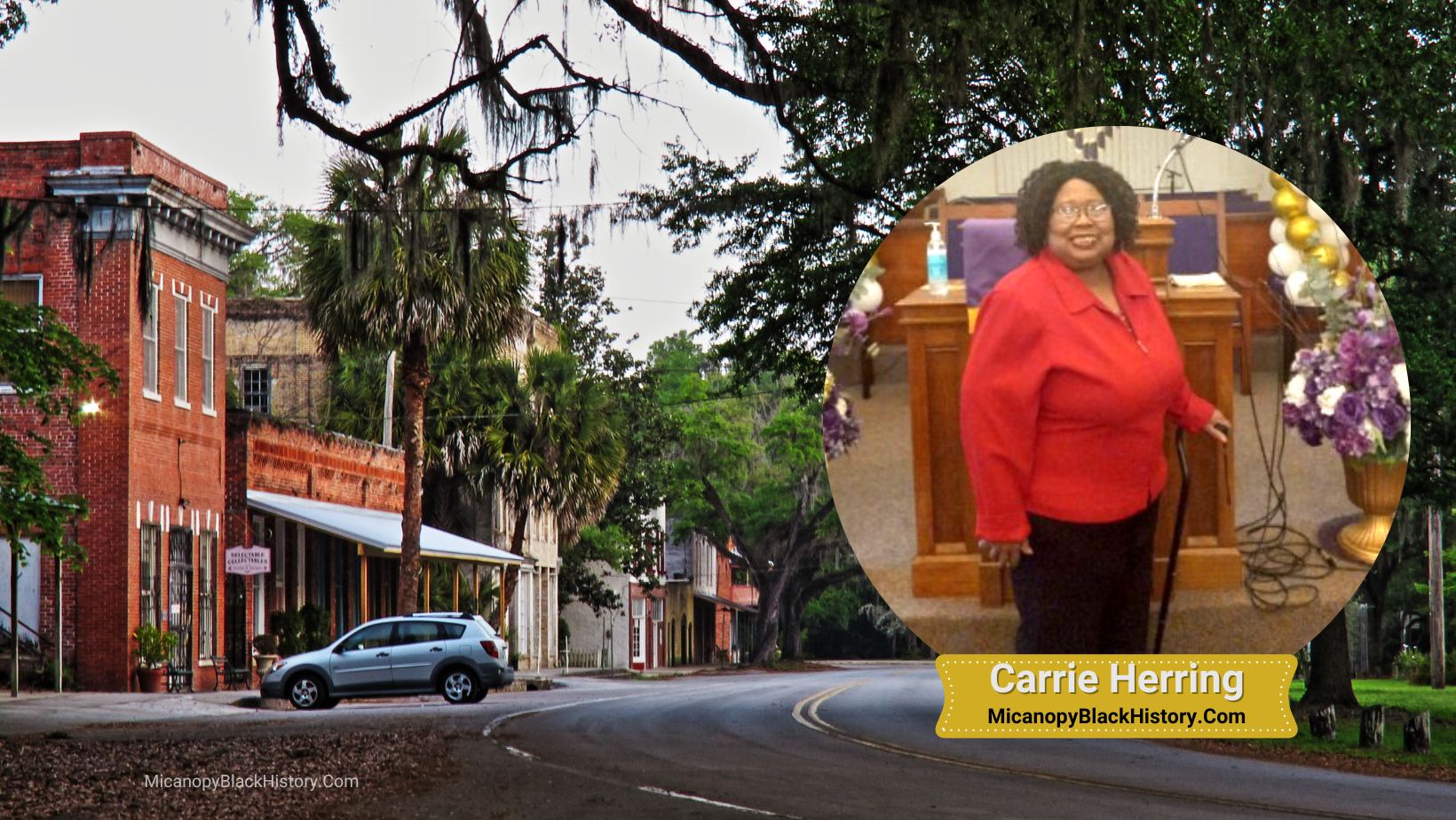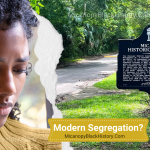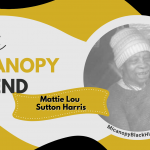Micanopy Is Home – Carrie Herring

All of Carrie Herring’s siblings have passed away. The thought of being the only child left from her large family elicits a soft sigh from the tiny woman. A fire destroyed all of her family’s precious momentos and photos but Carrie still remembers.
“I miss them,” Carrie whispers. “We always got along. We loved each other very much but now they’re all gone. I see people not speaking to their family and I don’t understand it. They were my favorite people. I would give anything just to spend a little more time with them.”
Carrie’s grandparents Mamie and Hilary moved her family to Micanopy, Florida around 1918 just after her mother Carrie Bell was born. Some twenty years later Carrie Bell met and married Gus Herring and together they raised eight children: Jessie, Almarie, Mamie, Gus Jr., Sidney (Gene), Caster Lee (Pete), Jimmy and Carrie.
Her earliest memories begin in the first grade when she attended the Colored School at Micanopy in 1954. She recalled how much the teachers there loved her and how much she felt safe and cared for by the staff.
“Life was great then! Everyone in Micanopy got along,” Carrie recalls. “We had good teachers at our school. I was so sad when we had to go to Lincoln High School in Gainesville.”
Being transported out of Micanopy to attend Lincoln High School had its advantages and disadvantages. Lincoln High School’s facilities were better than the Colored School at Micanopy but at the Colored School the students enjoyed dances and the opportunity to be a part of all types of sports teams. since most of the students from Micanopy lived out in the country, At Lincoln, they did not have transportation to and from sports practices which made it difficult to participate in team activities.
During summer vacations, regardless of their age, all of the local Black children in Micanopy met at the Colored School to listen to music, play games and socialize. Community members would organize picnics and parties with hot dogs and fried fish. Many parents would also host socials for the children on the weekends to keep them entertained. All of the parents trusted each other because everyone was close knit and knew each other. The children felt safe with any of the parents.
Carrie was baptised in The Paradise church, one of the oldest churches in Micanopy. The church would organize social activities for its members, playing Western movies on the lawn outside the church and socials for the youth once per month on Saturday nights. As the children grew older, they would hold house parties and all of the Black teenagers in Micanopy would attend to drink kool-aid and dance to records like Chubby Checkers doing the Twist.
As Carrie matured she watched Micanopy’s Black community shift from being close and protective of each other to more distant and guarded. Long standing Black families moved away and newcomers arrived and it wasn’t the same as when everyone felt like family.
As people came and went, Carrie always wanted to stay close to her roots in Micanopy. From the porch of the little white house with black trim that she grew up in, she dreamt of becoming a social worker because she loved kids and wanted to ensure that they were placed in loving homes.
By the time she graduated high school she knew that her parents could not afford to send her to college so she traded her higher education dreams for a more easily achievable job in Ocala as a quality control inspector for a clothing company. Over time the company began to outsource overseas and the workers lost their jobs, which turned out to be a blessing in disguise. Because Carrie and her co workers were a part of the Workers Union, they could file claim to the Trade Readjustment Act, a Federal program implemented in 2002 that provided assistance to adversely affected workers whose jobs were lost due to foreign trade.
Because of the funding from the Trade Readjustment Act, Carrie could then enroll in school like she always wanted to. She earned an associates degree in business administration while working in quality control for a medical parts company in Gainesville. After earning her degree in business administration, the manager of the medical parts company asked her if she would be comfortable becoming the head of quality control there. Altogether she worked for the medical parts company for 21 years before retiring in 2010.
After retiring, Carrie began working at the Micanopy Library for a couple of hours a day. Although Carrie misses her dearly departed family, she admits that being alone comes with a certain sense of freedom.
“I enjoy my life,” Carrie asserts. “I can do anything I please. If I feel like I want to pack my bags and go to Atlanta or Texas, there is nothing to hold me back.”
Carrie pauses before she continues, her eyes focusing out into the distance. “Micanopy is home,” she says. “There is no other place I would rather stay than Micanopy. This is where I will be passing away when my time comes.”
 Previous Post
Previous Post Next Post
Next Post

A beautiful story about a beautiful person. Thanks.